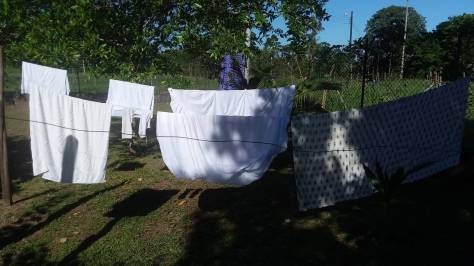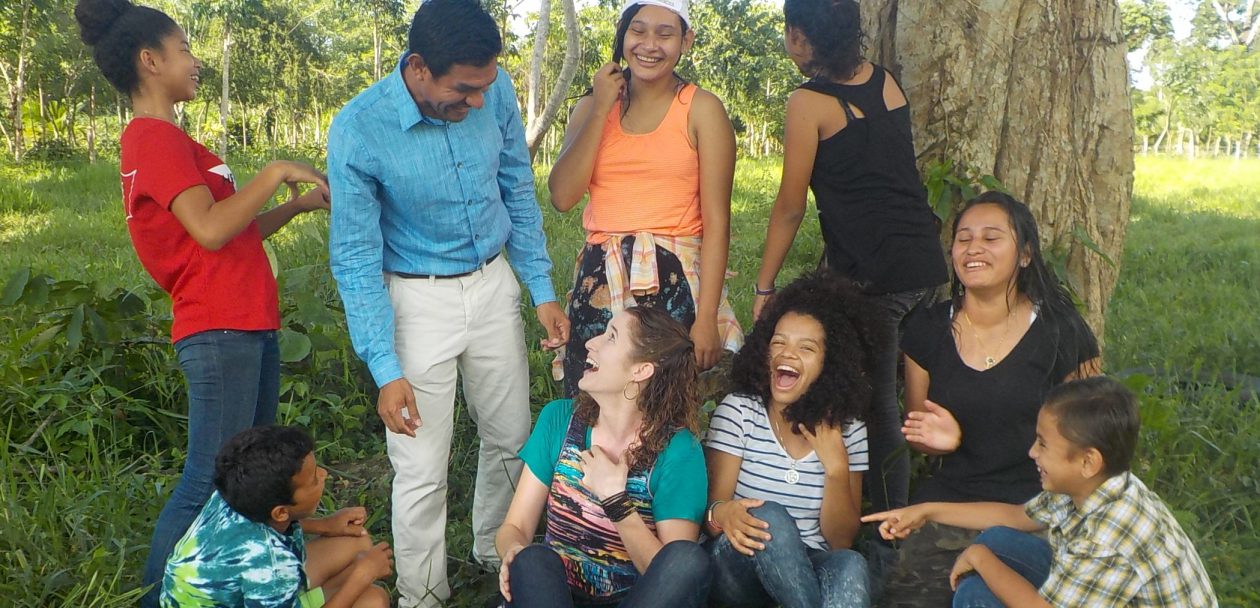The following experience that I will share with you has become entirely normal to me in 7+ years of living full-time in rural Honduras (and to millions of others around the world), but this morning as I was hand-washing 3 loads of laundry in our mosquito-infested outdoor ‘pila’ it occurred to me that our family’s modest washing method might present an intriguing perspective to those who have daily access to an indoor washing machine and dryer.

This morning I rolled out of bed at 7:08am — very late for us as we are normally in action by 5:15am on school/work days — and I began the process of preparing to wash. My husband had already been up almost an hour and was quietly at work in our little office building on the same property where we live and serve. Today was an unusual day in that our local missionary-teachers and students were on vacation and would not be coming to our rural ministry homestead for a normal day of classes and Christian discipleship.
This morning I would be washing not only mine and my husband’s clothes but also several of our foster kids’ bed sheets, a couple towels and our bathroom rug. (Generally speaking, the hardest things to wash are bed comforters and towels due to their bulk size and thickness). It had only been three days since I last washed, but our laundry basket was overflowing already.
I sighed. The process itself of hand-washing is relaxing, enjoyable and rewarding as I can spend the time praying or simply reflecting as I overlook our large grassy fields where our cattle graze, but the hoards of mosquitos that have been around for several weeks rob any sense of peace in the humble task.
It is currently the rainy season in Honduras, which on the whole brings tremendous blessing. The rains water the fields and fill the rivers (although not entirely, due to frightening levels of deforestation, but at the least the previously-dry rivers gain a slight, shallow current). The downside to the rainy season, however, is that the clothes hanging on the line don’t dry as quickly as they should (when they are almost ready to be brought in, many times it rains again and everything gets soaked, leading us to start again from ground zero with the drying process) plus there are droves of mosquitos everywhere, some of which port dangerous tropical diseases.
Knowing this, I sprayed my entire body down with the last of my mosquito repellent before putting my clothes on. Standing in my bedroom in nothing but my bra and underwear, I sprayed every inch of my body, knowing that as soon as I stepped outside dozens of mosquitos would come swarming around me, even trying to get to me through my clothing. Even my ears, forehead, cheeks and chin were lathered in bug spray. After finishing off my mosquito spray, I put on an old (thick) pair of sweat pants and an XXL t-shirt that many years ago was my dad’s. I had already brushed my teeth and my hair was up in a messy bun. If I stepped outside in sandals or barefoot, the mosquitos’ first target would be my feet and bare ankles, so I put on my husband’s tall black rain-boots (here used as agricultural work-boots).
I was as prepared as I could be, so I began the process of hauling all our dirty laundry outside in various large plastic washing bins, gathering the bag of detergent, the bleach, etc. As I stepped outside into our little side yard where our ‘pila’ (outdoor washing station) is situated, sure enough I was greeted my countless buzzing mosquitos (and our three guard dogs, seeking attention). I froze, standing next to our pila in all my washing attire, as my gaze carefully studied three or four mosquitos who were trying to land on my right arm. After a couple moments of trying to draw near, they finally gave up and flew off. My potential over-use of bug spray was paying off!
From there, I spent the next two hours happily hand-washing the contents of the large plastic laundry buckets.

My husband was single until he married me at age 30, so he had many years of experience hand-washing his own clothes. While in this culture many ‘macho’ men think that washing is strictly a woman’s job, my husband has a humble heart and does help from time to time if I am sick or overburdened with other tasks. (And I’m pretty sure he washes a whole lot better than I do.) He even gave our four teenage foster daughters an effective series of ‘how-to-wash’ lectures and hands-on demonstrations after we realized some of them had not been taking the appropriate amount of time to wash their clothes thoroughly.
We’ve tried many different systems with our household laundry over the years. Five or six years ago, when our foster children were younger, we hired a local woman to come out once or twice a week and help us wash their clothes, but that did nothing to foment responsibility in our children, so after a couple years we abandoned that method in favor of them washing their own clothes. (Our younger boys receive help from their older sisters to wash).
Asking our kids to wash their own clothes, however, has presented its own difficulties, as our kids are very active and their clothes oftentimes end up marked with dirt, grass stains, paint and other mystery substances that prove very tricky to get out of their clothes with our cold-water hand-washing method. For this reason, about 90% of the clothing we purchase for our household come from local thrift stores, because down here clothes and linens are oftentimes the first things to get destroyed (if not by stains, then by our pit bull ‘Thor’ who pulls down and then eats clothes off the line). Due to exorbitant humidity here, many of our clothes — if not washed immediately but rather left a few days in the laundry basket — acquire a stubborn type of local mold/fungus that appears as a series of small black dots all over the clothes, and it is nearly impossible to remove.
As you can see, hand-washing in Honduras is an art in and of itself and requires much strategy (and mosquito spray)!
With all that being said, this morning as I finished up the last of the clothes — our three guard dogs faithfully following me to and fro as I walked from the ‘pila’ to the clothesline and back again — I felt a very real sense of contentment bubble up within me upon completing such a simple but gratifying task.
And so I re-entered our home at about 9:00am, then soaked from the waist-down and my rain-boots squeaking across our tile floor as I quietly greeted our 6 foster children/teens who were still in the process of shaking off their slumber. Some laid out quietly on our living room couch reading while one of our older daughters contentedly practiced music. One went about sweeping each room in our house; another came up alongside of me to give me a warm hug and a good-morning smile.
I thanked God in my heart for this new day and for His blessing of peace over our family.

God bless you where you are, and let each of us live with joy in our hearts and thanksgiving towards Him for the life He’s given us. We trust that God has opened a way for us to live with and for Him through Christ, and that whatever hardship or trial we face in this world will soon pass away.
Sincerely,

Don’t worry about the mosquitos while we are visiting soon—they loooove me—I will keep them busy for awhile!! The outfit you wear to do laundry sounds similar to what you wore as a young girl (while vacuuming your bedroom 🙃)!
I love reading about you and your family. ❤🙏